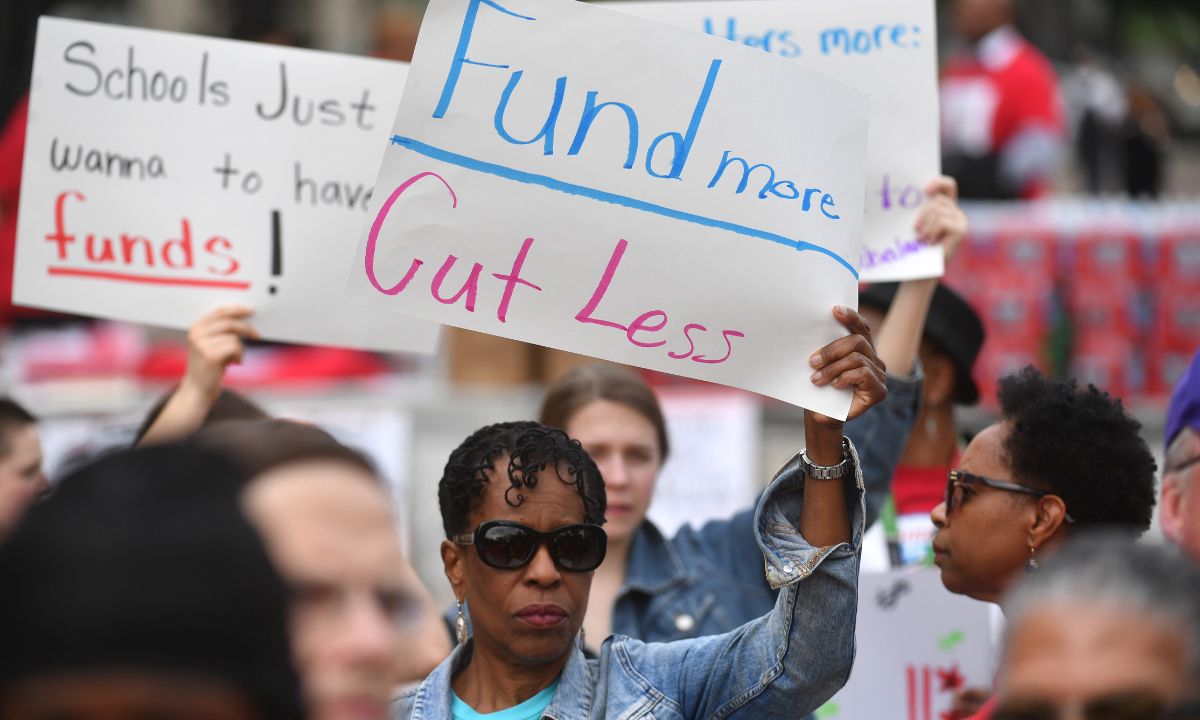School Boards Face Their Most Difficult Budget Season Ever. Many Are Unprepared
Roza & Anderson: Visits to 200 board meetings make clear just how inexperienced members are in making deep cuts, but financial training can help.

Get stories like these delivered straight to your inbox. Sign up for The 74 Newsletter
All around the country, districts are drafting budgets that will bring cuts to schools starting this fall. As those budgets come before school boards this spring, board members will undoubtedly hear from staff and families. Communities will push back against decisions that include layoffs; cuts to gifted programs, athletics and college advising; and reductions to tutoring, summer or afterschool offerings. The most upset will be those affected by decisions to close schools.
Boards are charged with approving the budget. In doing so, they authorize the district’s investments — and cuts. Furthermore, board members serve as a conduit between districts and communities, and it’s their job to bring the community along during difficult budget tradeoffs. When done well, it means that they’re helping communities understand the district’s financial outlook in advance and soliciting input on a range of budget-cutting options before final decisions are made. Board members then weigh in on budget drafts, seeking to leverage available dollars to do the most for students. Once the board signs the budget, members keep working with the community to share its rationale and the implications for students and staff.
The challenge is that most school boards have no experience with deep budget cuts. The typical district has seen a decade of solid budget growth, capped off with a hefty infusion of federal relief funds. But this fall brings a perfect storm, when relief funds dry up as enrollments continue to fall and districts must sort through commitments they made to new staff and inflation-era pay hikes.
As this budget season gets underway, that inexperience has been evident in many of the 200 school board budget meetings our team has observed as part of a federally funded research project.
Too often, we’re finding that the majority of trustees in these meetings aren’t engaging on budget discussions beyond a generic “let’s protect students and classrooms” statement or a “hearty thanks to the CFO for the presentation.” Too rarely do trustees investigate different budget options, weigh tradeoffs or explore expected impacts using student data.
Some boards use most of their time to dwell on the district’s lack of revenues or declining birth rates — neither of which is under their control — instead of using their time to decide how to spend what they do have. In one meeting, a trustee asked why even discuss the budget at all.
Sometimes there is deliberation, but often the back-and-forth reflects a lack of understanding of the major cost drivers and tradeoffs at play. A call for bigger pay hikes comes without an understanding that with a tight budget, higher salaries bring even more staff reductions. A request that any cuts come from the central office may not take into account that the needed cuts are bigger than all central staff salaries combined. A directive to avoid job reductions will mean gutting tutoring contracts and after-school programs, regardless of whether those are adding value for students.Sometimes trustees will misunderstand the budget timeline and wait until the final hour to engage. When a motion to cancel a cut during the final hearing doesn’t come with an offset, it can mean wiping out reserves and jeopardizing the district’s financial health. Who gets blamed when a district faces insolvency? The board.

Financial training can help.
Blaming board members for budget choices may not seem fair when few trustees have had meaningful training on budgeting with scarce resources. We believe state education agencies should require that boards are prepped for their financial responsibilities.
At Edunomics Lab, we’ve seen how a little training can go a long way toward equipping trustees with the skills needed to digest financial forecasts and budget-cutting options, deliberate using data and explain their choices. That’s why we’re offering a virtual workshop in April, designed to help leaders meet the budgeting challenges of this moment. (You can learn more about the finance workshop and register here.)
This year’s budget season will be a trial by fire for many board members. Deciding which investments stay and which must go is a tremendous responsibility. This year especially, boards will be in the hot seat as districts grapple with cuts that will affect those in their community. Today’s and tomorrow’s students depend on leaders to navigate this perfect storm to keep their district on solid financial footing while maximizing value with the dollars at hand.
Get stories like these delivered straight to your inbox. Sign up for The 74 Newsletter

;)

